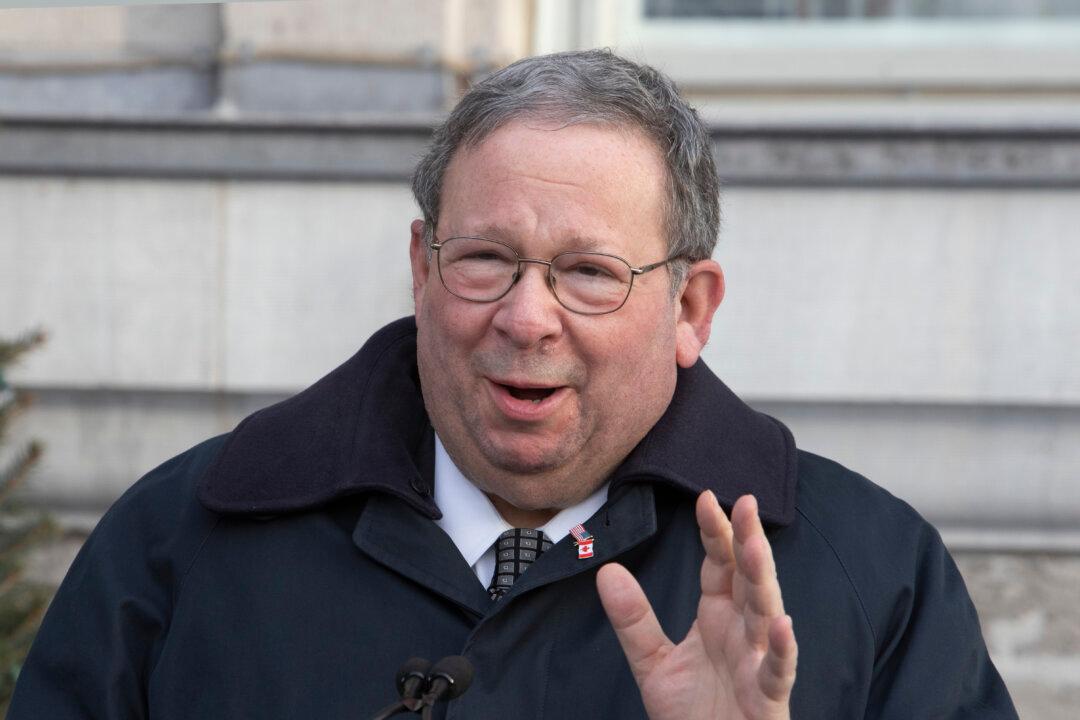It’s crucial that Ottawa and Washington present a united front to challenge Beijing’s global push to expand its military, economic, and authoritarian influence, says David Cohen, the newly appointed U.S. ambassador to Canada.
“I think for both Canada and the United States, and you could argue for every democracy in the world, China is our greatest threat,” Cohen told The Globe and Mail on Dec. 9.
“The fact is that China is very much aligned in an anti-democratic fashion and an authoritarian fashion.”
In his first interview since becoming the ambassador to Canada, Cohen stressed the need for democracies to challenge authoritarianism in general and, in particular, Beijing’s cyber security threats and human rights abuses.
“China is the poster child of what we are trying to combat together,” he said.
Cohen is an attorney and lobbyist who served as a senior adviser at the U.S. telecommunications giant Comcast. He is pleased with Ottawa’s new direction in its China policy and commitment to deeper partnerships in the Indo-Pacific region.
“It is important as Canada articulates its China policy, as the United States refines its China policy, that we do so in alignment with each other,” he said. “Canada is arguably our most important ally and being in alignment on a fundamentally critical relationship like China is really important to that long-term relationship.”
Ottawa’s Indo-Pacific strategy emerged in the aftermath of its three-year diplomatic freeze with China once Michael Spavor and Michael Kovrig returned safely to Canada in September. The two were arbitrarily detained in Chinese prisons for over 1,000 days in what is widely viewed as retaliation for the arrest of Huawei executive Meng Wanzhou on a U.S. extradition warrant in 2018.
The Nov. 23 throne speech acknowledged this priority by stating that “a changing world requires adapting and expanding diplomatic engagement. Canada will continue working with key allies and partners, while making deliberate efforts to deepen partnerships in the Indo-Pacific and across the Arctic.”
Cohen also expressed concern over China strengthening its geopolitical power by acquiring critical rare-earth minerals or taking over key sectors in Canada.
In a March research paper titled “The Geopolitics of Critical Minerals Supply Chains,” author Jane Nakano noted that China is “home to roughly one-third of global rare-earth reserves” and, to compensate for any resources it lacks, has “invested in mining projects abroad.”
China realizes that its critical mineral resources grant it considerable geopolitical leverage, writes Nakano who is a senior fellow in the Energy Security and Climate Change Program at the Center for Strategic and International Studies, a think tank based in Washington, D.C.
In response to the threat from Beijing, Canada and the United States signed a memorandum of understanding in August to accelerate research, development, and the procuring of critical minerals vital to national security, energy transition, and global competitiveness.
In July, the Trudeau government also released new guidelines to protect Canadian research and intellectual property from foreign interference, espionage, and theft, specifically from China, as the Canadian Security Intelligence Service has repeatedly warned.
Cohen emphasized that the threat of Chinese cyberattacks that could wreak havoc in Western financial markets is a particular concern of the Biden administration.
“China is a state actor and has been known to hack and invade computer networks in critical industry areas,” he said. This is a strong motive for the U.S. and Canada to be “aligned and working together and being prepared to surveil and block those types of threats.”
When asked why Canada remains the only member in the Five Eyes alliance consisting of Canada, New Zealand, United States, Australia, and the UK that is yet to ban Huawei from its 5G networks, the ambassador declined to comment saying only that Prime Minister Justin Trudeau has promised a decision is forthcoming.
In late September, Trudeau said his cabinet will decide whether to ban Huawei “in the coming weeks.”
“We continue to weigh and look at different options, but we will be no doubt making announcements in the coming weeks,” he told reporters on Sept. 28 during his first news conference a week after his re-election.
With files from The Canadian Press





